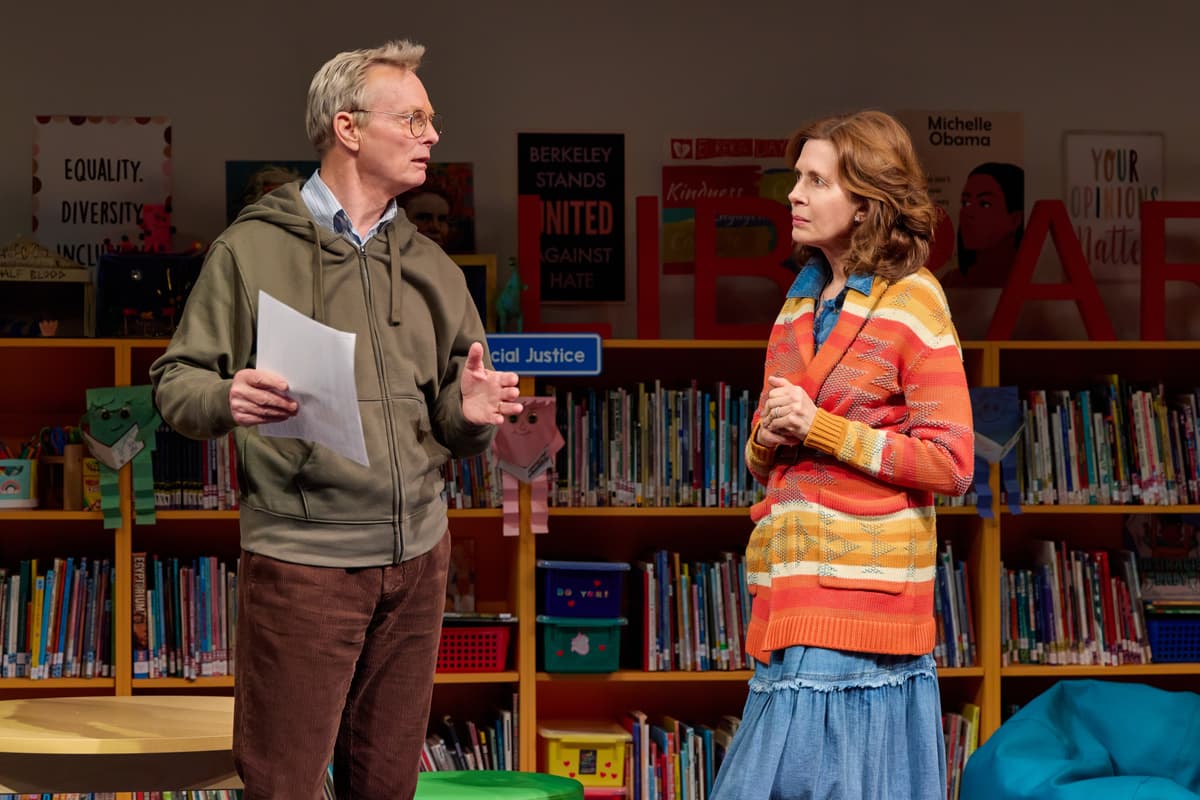Tumult Over Vaccines Bedevils a Well-Heeled Private School in the Whip-Smart ‘Eureka Day’
The pandemic hovers over this comedy like a storm cloud.

The title of playwright Jonathan Spector’s Broadway debut, “Eureka Day,” refers to a private elementary school nestled in the hills of Berkeley. It’s the kind of place in which the library, where the play is set, categorizes books as “fiction,” “non-fiction,” or “social justice.” One poster decorating the walls declares, “We Are the Resistance;” another acknowledges that the school “is located on the unceded territory of the Chochenyo-Speaking Lisjan Ohlone People.”
The action unfolds at the beginning of the 2018-19 academic year, immediately preceding the one that brought us Covid. Yet the pandemic hovers over this whip-smart comedy like a storm cloud, and the mostly well-heeled, well-meaning parents and education official who make up its characters are already enmeshed in the progressive mores that have exploded even beyond tony neighborhoods and elite institutions in recent years.
“There’s no benefit in Feeling Seen if you’re simultaneously Being Othered,” posits the doyenne of the school board, Suzanne, during its first meeting of the year. She and the head of school, Don, and three other parents are having one of those tortured conversations about what language is appropriate and what’s offensive. A plate of half-eaten artisanal scones sits on a table in Todd Rosenthal’s chic, brightly colored set, a playground for privileged children.
Alas, the troubles that will soon descend on the Eureka Day community go deeper than debates over proper terms and pronouns. Only minutes into the board’s second meeting, it’s disclosed that one of the students has been diagnosed with mumps; in the scenes that follow, the fastidious politeness that characterized the board’s first gathering unravels, as a very topical subject — vaccine safety and efficacy — becomes a hot-button issue.
One very funny, if overlong, segment, documents a virtual “Community Activated Conversation” organized by Don, where the board members huddle around a laptop and address the concerns of parents, who type in questions and comments. Their exchanges grow increasingly agitated, with more and more words spelled in all capital letters, visible to audience members on a large screen, and embellished by multiple exclamation points.
“When you bring Little Miss Typhoid Mary to school, you put all our children at risk,” one parent chides another. Someone else weighs in: “Remember that time I got crippled from polio? Oh, no wait. I didn’t. Because I got (expletive) VACCINATED.” The wisecracker is reprimanded in italics: “Your complacency in the destruction of children’s lives is disgusting.”
The board members don’t all see eye to eye either. A single mom in her 30s, Meiko, who happens to be fooling around with one of her married colleagues, Eli, hasn’t had her daughter vaccinated. Suzanne, the eldest aside from Don — she jokes at one point about having gone through “eight rounds of IVF…because I wasn’t ready to leave Eureka Day” — is of a similar mind, and her opinion has been shaped by harrowing personal experience.
Suzanne is an especially juicy character, warm and gracious to the point of self-consciousness but also imperious and controlling. While proudly, ostentatiously liberal, she still, like many of that type, clings to a more conservative world view; for instance, she assumes that the new parent on the board, an elegant woman named Carina, is receiving financial aid, plainly because Carina is Black or biracial.
Happily, director Anna D. Shapiro, who has an illustrious history of finding comedy in discord, has assigned the role of Suzanne to a theater veteran whose distinctive presence and exquisite comic timing are ideally suited to the part, Jessica Hecht. Ms. Hecht’s Suzanne is, like many women she has played, a little flighty on the surface, but the actress also, eventually, mines the deep pain this character carries inside her with shattering authenticity.
Amber Gray brings an effortless dignity to Carina, who quickly finds her footing and emerges as a rival to Suzanne’s authority. As the rather temperamental Meiko and Eli, who’s complacent and a bit clueless but fundamentally decent, Chelsea Yakura-Kurtz and Thomas Middleditch engagingly flirt, spar, and endure their own crises.
Don is played by the estimable Bill Irwin, who predictably finds the clown in this scrupulously well-intentioned but overburdened fellow. Don gets to say the last sentence in “Eureka Day,” which serves as a brilliant punchline for a play that finds refreshing humor, and some poignance, in subject matter that has proven burdensome for all of us.

